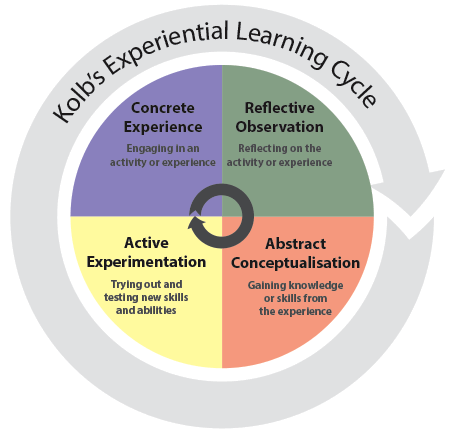Knowing your predominant intelligences is a great first step towards increased self-awareness. You can now see why you prefer doing certain things in certain environments, rather than others. Now how do you apply it to new experiences? You combine your knowledge on intelligences to your preferred learning style.
Honey and Mumford’s Learning Styles
Learning styles were developed by Peter Honey and Alan Mumford, based on the work of David Kolb who created a model of learning in the 80s. Kolb’s model proposed that we all learn in a cyclical way:

Honey and Mumford initiatied the idea that while we go through a circle as we learn something, individuals prefer to start in different places of the circle and might spend more or less time in each stage. Based on this, they identified four distinct learning styles or preferences: Activist, Theorist; Pragmatist and Reflector. In their book Manual of Learning Styles, they wrote that there are 3 main benefits in discovering your learning style, your starting point:
- “Become smarter at getting a better fit between learning opportunities and the way you learn best. This makes your learning easier, more effective and more enjoyable. It saves you tackling your learning on a hit-and-miss basis. Equipped with information about your learning preferences, you’ll have many more hits and fewer misses.”
- “Expand the ‘band width’ of experiences from which you derive benefit. Becoming an all-round learner, increases your versatility and helps you learn from a wide variety of different experiences – some formal, some informal, some planned and some spontaneous.”
- “Improve your learning skills and processes. Increased awareness of how you learn, opens up the whole process to self-scrutiny and improvement. Learning to learn is your most important capability since it provides the gateway to everything else you want to develop.”
The awareness of your learning style is an amazing opportunity to understand yourself better but also seek out new opportunities. Want to do the test Honey and Mumford developed?
The 4 learning styles
Activists
Activists involve themselves fully and without bias in new experiences. They enjoy the here and now and are happy to be dominated by immediate experiences. They are open-minded, not skeptical, and this tends to make them enthusiastic about anything new. Their philosophy is ‘I’ll try anything once’. They tend to act first and consider the consequences afterwards. Their days are filled with activity. They tackle problems by brainstorming. As soon as the excitement from activity has died down they are busy looking for the next. They tend to thrive on the challenge of new experiences but are bored with the implementation and longer-term consolidation. They are gregarious people constantly involving themselves with others, but in doing so they seek to center all activities on themselves.
Reflectors
Reflectors like to stand back to ponder new experiences and observe them from many different perspectives. They collect data, both first and from others and prefer the think it through thoroughly before coming to a conclusion. The thorough collection and analysis of data about experience and events is what counts so they tend to postpone reaching definitive conclusions for as long as possible. Their philosophy is to be cautious. They are thoughtful people who like to consider all possible angles and implications before making a move. They prefer to take a back seat in meetings and discussions. They enjoy observing other people in action. They listen to others and get the drift of the discussion before making their own points. They tend to adopt a low profile and have a slightly distant, tolerant unruffled air about them. When they act, it is part of a wide picture which includes the past as well as the present and others’ observations as well as their own.
Theorists
Theorists adapt and integrate observations into complex but logically sound theories. They think problems through in a vertical, step-by-step logical way. They assimilate disparate facts into coherent theories. They tend to be perfectionists who won’t rest easy until things are tidy and fit into a rational scheme. They like to analyse and synthesise. They are keen on basic assumptions, principles, theories, models and systems thinking. The philosophy prizes rationality and logic. ‘If it’s logical, it’s good’. Questions they frequently ask are “Does this make sense?”, “How does this fit with that?”, “What are the basic assumptions?” They tend to be detached, analytical and dedicated to rational objectivity rather than anything subjective or ambiguous. Their approach to problems is consistently logical. This is their ‘mental set’ and they rigidly reject anything that doesn’t fit with it. They prefer to maximise certainty and feel uncomfortable with subjective judgements, lateral thinking and anything flippant.
Pragmatists
Pragmatists are keen to try out new ideas, theories and techniques to see if they work in practice. They positively search out new ideas and take the first opportunity to experiment with applications. They are the sort of people who return from a management course brimming with new ideas that they want to try out in practice. They like to get on with things and act quickly and confidently on ideas that attract them. They tend to be impatient with ruminating and open-ended discussions. They are essentially practical, down to earth people who like making practical decisions and solving problems. They respond to problems and opportunities ‘as a challenge’. Their philosophy is: ‘there is always a better way’ and ‘if it works its good’
What’s next
Think about ways you are currently learning new things:
- How could you shift your method of learning to use more your preferred style?
- When you use your preferred style, how does that make you feel?
- What is your approach to new experiences?
- How can you combine your main intelligences to your preferred learning style?
Sources:
- https://www2.le.ac.uk/departments/gradschool/training/eresources/teaching/theories/honey-mumford
- https://www.futureschool.com/blog/learning-styles-activist-pragmatist-theorist-reflector-one-child/
- http://www.nwlink.com/~donclark/hrd/styles/honey_mumford.html
- https://www.skillsyouneed.com/learn/learning-styles.html

